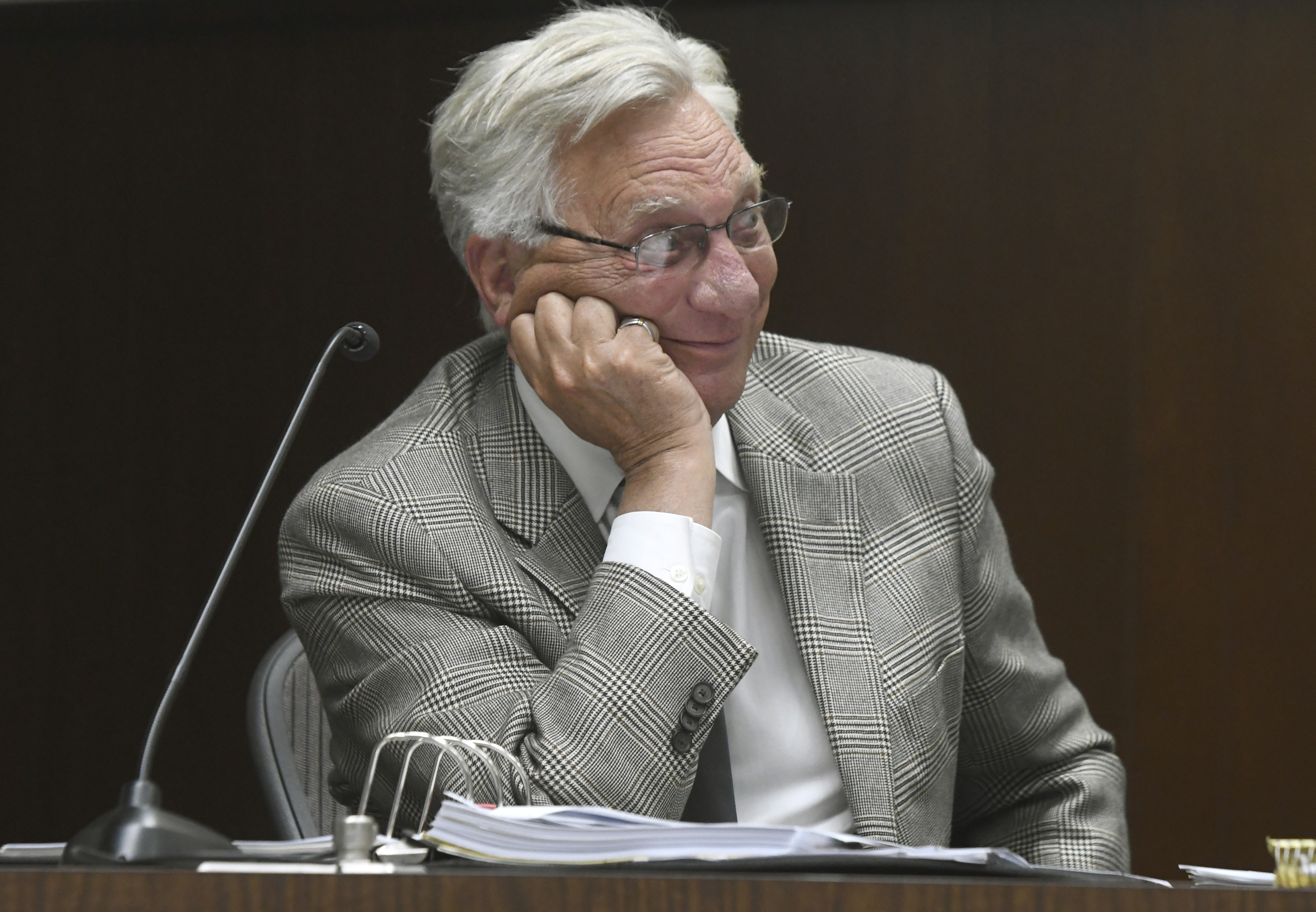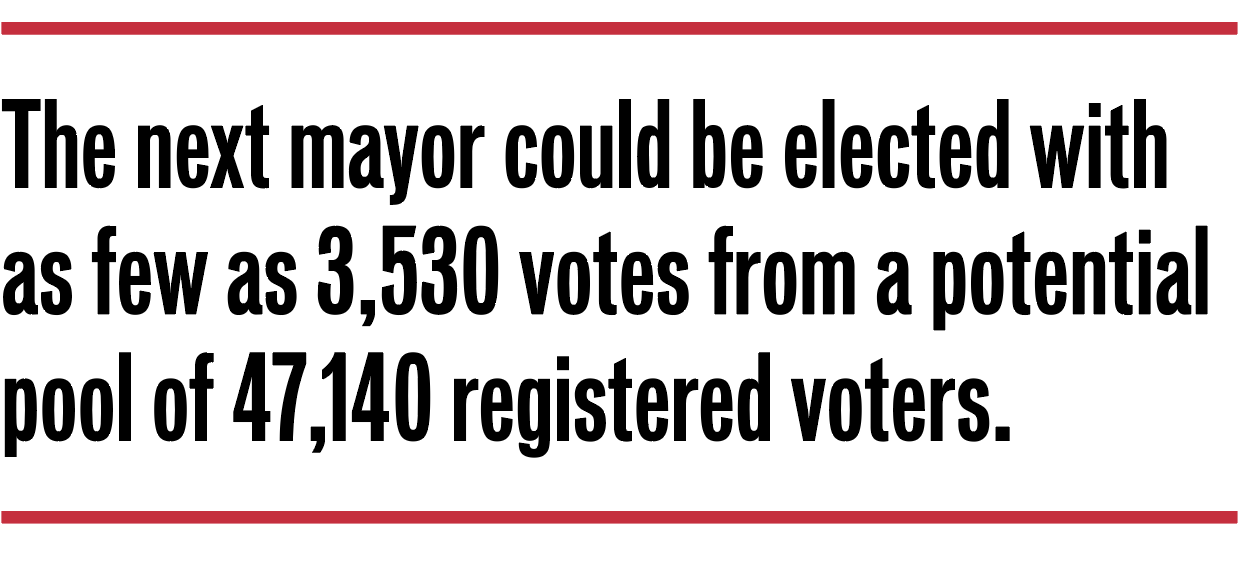Conservative Frank Hotchkiss Has Path to Mayor’s Seat
Low Turnout and Split Democratic Field Could Pave Him the Way to Victory

In normal times, Frank Hotchkiss would be a long shot to win this November’s mayoral race. The conservative councilmember who doubts traditional climate-change science and endorses a southern border wall is campaigning in a city where registered Democratic voters outnumber Republicans by more than 2 to 1, and he’s swimming against a 40-year tradition of progressive politicians occupying Santa Barbara’s top elected office, which championed the birth of the modern environmental movement and serves a large immigrant community.
But these are not normal times. This is not an ordinary mayoral race. And Hotchkiss has a realistic chance of victory.
In this year’s contest, colored by bitter political partisanship under a schismatic new presidency, Hotchkiss is squaring off against a trio of equally matched liberals — councilmembers Cathy Murillo and Bendy White, and former Santa Barbara mayor Hal Conklin — who threaten to split the Democratic vote into three even slices. Angel Martinez, a fiscally conservative but socially progressive decline-to-state candidate, could also steal away critical support for the Democrats in an off-year election, where older, wealthier, more conservative voters almost always turn out in larger numbers.
In fact, according to recent polling, only 16,814 of Santa Barbara’s 47,140 registered voters — 35 percent — are expected to cast a ballot. Of those, 84 percent are 50 years old or older; 26 percent are registered Republicans, and 14 percent are No Party Preference. While council seats are now chosen by district, the mayor’s position remains at-large, meaning all city voters weigh in.

With such a small voting pool, Santa Barbara’s next mayor could be elected by as few as 3,530 residents, according to the polling data. Gail Teton-Landis, new chair of the Santa Barbara County Democratic Central Committee, which has thrown its weight behind Murillo, admitted she’s worried about the split vote. “Of course I have concern,” she lamented about the crowded and competitive field. “Democrats need to learn how to do math.”
Hotchkiss — a former journalist, actor, and publicist, and now a real estate agent and author — was elected to the council in 2009. He was part of a cadre of conservatives, including Dale Francisco and Michael Self, backed with the overwhelming financial firepower of shadowy Republican kingmaker Randall Van Wolfswinkel, a Texan with a house in Montecito. They resisted so-called traffic-calming devices — i.e., bulb-outs and intersection redesigns — meant to encourage alternative modes of transportation, and their elections represented a major shift of the council’s political makeup.
But it was City Hall’s approval of the Light Blue Line that really inspired Hotchkiss’s interest in local politics. The controversial strip of paint proposed along downtown streets and sidewalks was meant to highlight the threat of global warming and illustrate where Santa Barbara’s new tide line would be if Greenland’s ice sheets were to melt and raise the sea level by 21 feet. Hotchkiss argued the project was a waste of city money, and he worried about the effect it would have on property values. At the time, Hotchkiss said he didn’t doubt global warming was taking place, but he wondered if it was such a bad thing. “The Northwest Passage is opening up,” he said. “It might be great for commerce.”
Over the next eight years, Hotchkiss maintained a stubborn skepticism about climate change. When the city considered a ban on single-use plastic bags in 2011, he argued that they posed a minimal risk to sea life, which could poop out any ingested bags. At the next council meeting, the environmental activist group Save the Mermaids offered him a plastic-bag sandwich. Always mindful of tax increases in the name of sustainability, Hotchkiss was the only councilmember to vote against Santa Barbara’s pledge to adopt 100 percent renewable energy by 2030, citing a concern over rate increases.
This week, Hotchkiss articulated his stance on climate change once more: “I would say I adhere to Shakespeare’s view that we are very small players on a vast, vast stage. So any contribution to the atmosphere we make is infinitesimal compared to that of nature.” He also provided an analogy to purchasing renewable energy, which he said isn’t nearly as dependable and inevitably raises rates: “Would you buy a car that you love but is more expensive and breaks down now and then, or would you buy a car that may not be as beautiful but is more reliable and costs less?” Looked at that way, he said, the better choice is obvious.
Despite routine disagreements with Santa Barbara’s environmentally minded majority, Hotchkiss has nevertheless shown a willingness to break from his bloc on other key issues. He voted in favor of mandatory Zoning Information Reports for property owners, despite strong resistance from fellow realtors, and was critical of the proliferation of short-term vacation rentals early in the debate. Hotchkiss was also instrumental in brokering a hard-won peace accord in the battle over the new Sola Street bike lane. On the dais, he’s direct and succinct and asks sharp, pertinent questions. Conversations with other councilmembers paint a picture of an honest, pragmatic colleague strong in conviction but sometimes out of touch with the whole of Santa Barbara.
Hotchkiss raised eyebrows on both sides of the aisle earlier this year when he wrote an opinion piece for the Santa Barbara News-Press suggesting that World War II Japanese internment camps were not racially tinged or emotionally damaging. “When I came to California in 1971, I met a number of Japanese Americans,” he wrote. “To a man and woman, they were proud of their adopted country. They held no grudge over their internment, and I never, ever heard any mention of reparations to redress the wrong.”
Hotchkiss blamed misinterpretation of the U.S. government’s motives when it incarcerated approximately 120,000 Americans of Japanese descent in the wake Pearl Harbor. He said it was a national security necessity. “Those who say racism was the reason for Japanese relocations in 1942 are viewing history through a lens popular in some circles today,” he wrote. “For such people, racial friction is an indelible stain on America, and always has been and always will be.”
On issues of race and immigration, specifically his stances on the potential repeal of the federal DACA (Deferred Action for Childhood Arrivals) program and the travel ban, Hotchkiss didn’t mince words. Those who wish to become Americans citizens through the DACA program should take every legal step possible to do so. “And if I were one of them, I would ask my parents for their financial assistance in this regard since their actions are what put me in this difficult position in the first place,” he said. The travel ban, he went on, is a critical safeguard against terrorists in disguise. “We are dealing with a wily, vicious adversary, and they have proven they are willing to do anything to undermine our country and our civilization,” he said.
In campaign speeches, Hotchkiss touts himself as the “law and order” candidate committed to “cleaning up State Street” by cracking down on the nuisance behavior of homeless people. He’s also very much against the concept of sanctuary cities and was a vocal proponent of the proposed gang injunctions. Hotchkiss takes credit for the spike in cruise ships visiting Santa Barbara every year and talks often about bringing more economic vitality to the city. He’s made no secret of his dislike for the proposed sales-tax increase — Measure C — that will also appear on November’s ballot to fix crumbling roads and pay for a new, $80 million police station.
Despite his greater-than-normal odds in the mayoral race, Hotchkiss still has a steep hill to climb. Each of his Democratic challengers has strong backers and deep purses. Angel Martinez is poised to give all of them a run for their money, and counts among his supporters the quietly influential political strategist Jim Westby, formerly a strong advocate for Hotchkiss. It’s clear the Hotchkiss campaign feels especially threatened by Martinez and his ties to downtown business interests. More than once, it’s sought to pigeonhole him as a closet Democrat by highlighting his past praise of Barack Obama and more recent contributions to Hillary Clinton. To further rattle his cage, Hotchkiss recently crashed one of Martinez’s campaign events in the Funk Zone but was asked to leave.
Nevertheless, Hotchkiss’s Republican allies are bullish on his chances. “People are underestimating the support Frank has from pro-business Democrats and Independents,” said Mike Stoker of the Santa Barbara County Taxpayers Association. “I think he’s well on his way to becoming mayor.”



